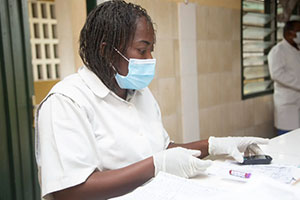The Didida project, which stands for Digital Innovations and Diagnostics for Infectious Diseases in Africa, unites 14 partners from eight nations: Kenya, Senegal, Tanzania, Uganda, the UK, France, the Netherlands, and Italy.
It is supported by money of €2 million (£1.75 million) from the UK Research and Innovation fund and €6 million (£5.2 million) from the European Union’s Horizon Europe programme.
The project’s goal is to establish a graduate programme in Sub-Saharan Africa with a cohort of 16 PhD students from various fields, such as social science, healthcare economics, and digital technologies. This new generation of researchers will be given the resources they need by cohort events to help advance the fight against illnesses in Africa.
The students will be a part of a team that develops solutions to enhance patients’ access to healthcare in underserved rural areas with limited resources by utilising mobile diagnostics and digital medicine.
The Didida team will improve diagnostic tools for infectious diseases in rural regions over the following five years, drawing on prior research and development collaborations spearheaded by the university’s James Watt School of Engineering.
With assistance from local researchers and the government, Glasgow researchers have already created prototypes of the system to diagnose diseases like malaria and schistosomiasis and field-tested them in Uganda.
By offering a straightforward, affordable mobile autonomous diagnostic tool that can diagnose various illnesses, including malaria, in a single session, Didida will build on that research and enable better patient care.
With the help of Professor Frances Mair of the University of Glasgow’s School of Health & Wellbeing, who has expertise in the use of digital wearables for monitoring co-morbidities, it will also relate these disorders to non-communicable diseases like diabetes or hypertension.
It will be possible to access top-notch diagnostic assays in places with limited health infrastructure by connecting the test to mobile phones.
Health professionals will have access to the gathered data to directly recommend treatments to patients, and they will also gain from regional data to help local decision-making. Each technology is built on open-source, transparent, and simple-to-deploy solutions, like m-Health for the mobile data application and the DHIS2 health data infrastructure that is already in place.
The project will capitalise on Sub-Saharan Africa’s advantages in mobile payment and health services, which reach millions of people. Didida will rely on the expertise of reputable operators to carry out the project’s digital component.
In order to gather and process test data in Senegal, Tanzania, and Uganda, the consortium intends to put into place the first platforms within the continent’s health infrastructures.

